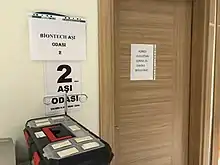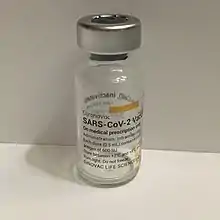COVID-19 vaccination in Turkey
The COVID-19 vaccination campaign in Turkey began on 14 January 2021.[2] As of 2 April 2022, 57.784.362 people have received their first dose, and 52.982.877 people have been fully vaccinated.[1] Also, 27.648.857 people received their third dose.[1]
| Date | 14 January 2021 (2021-01-14) – present |
|---|---|
| Location | Turkey |
| Cause | COVID-19 pandemic |
| Target | Full immunisation of people in Turkey against COVID-19 |
| Participants | 53.024.115 people completely vaccinated (22 May 2022)[1] |
| Website | covid19asi |
The population of Turkey is approximately 83 million, meaning 63% of the population is fully vaccinated. In order to enter turkey you will need to have received 2 vaccinations and 1 booster jab.[3]
Effect of Vaccine
In January 2021, new COVID-19 cases in Turkey were at 12,203. Then, in April 2021, they rose to 40,806. However, due to the vaccine rollout, cases dropped to 5,288 in July 2021.[4]
Public Perception of Vaccine
Through a study done on the population of Turkey's perception of the COVID-19 vaccine, it was shown that only 62.7% of participants had a positive perception of the vaccine. Specifically, people with previous experience with COVID-19, people with bachelor's degrees or higher, and people with experience with influenza vaccines were more likely to have a positive perception of the COVID-19 vaccine. However, older people were more likely to have a negative perception of the vaccine.[5]
Vaccines on order

There are several COVID-19 vaccines at various stages of development around the world. Turkey currently uses 4 different vaccines.[6][7]
| Vaccine | Approval | Deployment |
|---|---|---|
| Pfizer–BioNTech | ||
| Sinovac | ||
| Sputnik V | ||
| TurkoVac |

Vaccination statistics
New vaccination per day 7-day moving average
First dose Second dose
First dose Second dose
Gallery
- Vaccines used in Turkey
 Sinovac
Sinovac BioNTech
BioNTech.jpg.webp) Sputnik V
Sputnik V
References
- "COVID-19 Aşisi Bilgilendirme Platformu" [COVID-19 Vaccine Information Platform]. Turkish Ministry of Health.
- "Turkey begins mass COVID-19 vaccination with Sinovac's jabs". Xinhua News Agency. 14 January 2021. Retrieved 1 July 2021.
- Ağbulut, Ümit (2022-01-01). "Forecasting of transportation-related energy demand and CO2 emissions in Turkey with different machine learning algorithms". Sustainable Production and Consumption. 29: 141–157. doi:10.1016/j.spc.2021.10.001. ISSN 2352-5509. S2CID 241144380.
- Atik, I. (2022). Performance comparison of regression learning methods: COVID-19 case prediction for turkey. International Journal of Mechanical Engineering, 7(1). https://kalaharijournals.com/resources/IJME_Vol7.1_640.pdf
- Sonmezer, M. C., Sahin, T. K., Erul, E., Ceylan, F. S., Harmurcu, M. Y., Morova, N., Al, I. R., & Unal, S. (2022, February 11). Knowledge, attitudes, and perception towards COVID-19 vaccination among the adult population: A cross-sectional study in Turkey. MDPI Open Access Journals. https://doi.org/10.3390/vaccines10020278
- Tasdemir, Firat (2 April 2021). "1st doses of Pfizer-BioNTech jab administered in Turkey". Anadolu Agency.
- Aydogan, Merve (30 April 2021). "Turkey OKs emergency use of Sputnik-V vaccine". Anadolu Agency.
| |||||||||||||||||||||||||||||||||||||||||||||||||||||||||||||||||||||||||
| |||||||||||||||||||||||||||||||||||||||||||||||||||||||||||||||||||||||||
| |||||||||||||||||||||||||||||||||||||||||||||||||||||||||||||||||||||||||
| |||||||||||||||||||||||||||||||||||||||||||||||||||||||||||||||||||||||||
| |||||||||||||||||||||||||||||||||||||||||||||||||||||||||||||||||||||||||
| |||||||||||||||||||||||||||||||||||||||||||||||||||||||||||||||||||||||||
| |||||||||||||||||||||||||||||||||||||||||||||||||||||||||||||||||||||||||
| |||||||||||||||||||||||||||||||||||||||||||||||||||||||||||||||||||||||||
COVID-19 vaccination in Asia | |
|---|---|
| Sovereign states |
|
| States with limited recognition |
|
| Dependencies and other territories | |
| |
COVID-19 vaccination in Europe | |
|---|---|
| Sovereign states |
|
| States with limited recognition |
|
| Dependencies and other entities | |